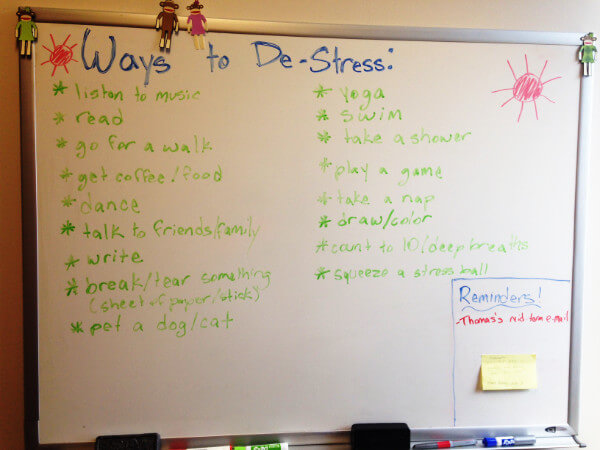By Melissa Hall, Academic Tutor CLE Austin

This isn’t surprising, as anxiety and stress are part of most college students’ lives, and women are nearly twice as likely as men to feel stressed, as reported by a University of Cambridge study.
“[As a woman] I feel really pressured to appear strong,” Jenna said. “I always feel that I have to prove myself and that people are going to think she’s not competent.”
Whether “it” be academics or another activity, many students feel the need to not only do it well, but to do it perfectly.
Stress can be triggered by just about anything—school projects, a change in schedules, an anxiety flare-up—and Kathryn and Jenna both said it can be difficult finding ways to cope. While there’s no perfect solution to prevent stress, there are many things they try in order to reduce it.
1. Be Mindful

“All these thoughts keep popping up. It’s hard to get rid of them,” she said.
While Kathryn doesn’t consciously think about being mindful on a regular basis, she said she does try to stay focused on what’s in front of her.
“If I think too much about other things like [stress, pressure, the future,] I start getting really anxious. I try to permanently keep myself in the moment,” she said.
2. Get Active
Symptoms of anxiety and stress range from high blood pressure, tense muscles, and increased heart rates to insomnia, headaches, and depression. Being active can help reduce symptoms of stress by increasing energy and even improving mood.
“Sometimes when I get stressed I lay down and stay in one spot, [but] exercise is great,” Jenna said. “Whenever I exercise when I’m stressed it gets my mind off it.”
Kathryn said exercise or getting outside helps her relieve some of her anxiety when it starts to build.
“I don’t always have the strength or the health to go out for a walk, but sometimes I find that sitting in nature really helps,” she said. “Life isn’t quite as busy.”
3. Talk About Your Problems
Discussing things that are bothering you with another person that you trust, such as a family member or close friend, can have amazing results when it comes to relieving stress.
Kathryn mentioned that it helps having “someone to rant to,” and ultimately, someone who can sympathize.
Jenna said that she frequently talks to her mom, a person who understands her panic attacks and has been there from the beginning.
“I’ve noticed [stress] affects my mood. It makes me really irritable because I’m upset that I’m so stressed and I’m thinking I’ll never get through this,” Jenna said.
Luckily for both Kathryn and Jenna, who are moving in together this summer, they may be able to help each other in this regard.
4. Make a List
Discovering new ways to de-stress and creating a list of remedies can be useful. Post the list somewhere prominent in your workspace, and whenever you feel stressed try one of them out.









